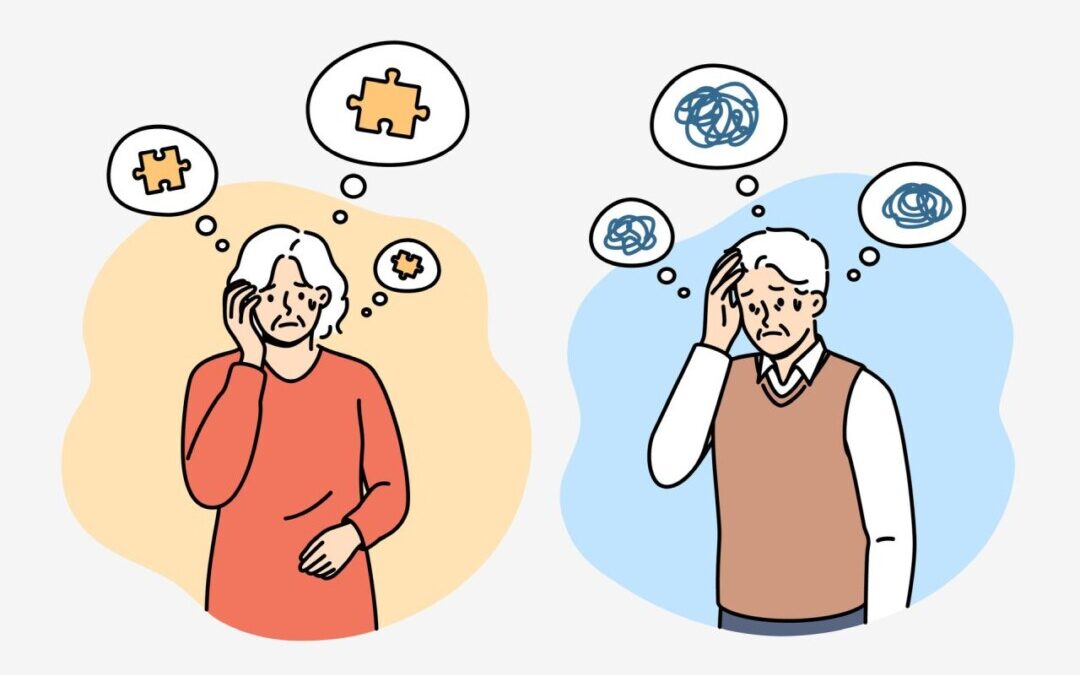Occasional forgetfulness, like misplacing keys or struggling to remember names, is normal as we age. These memory lapses, while common, often lead to concerns about dementia. To clarify, it’s important to understand the differences between normal aging-related changes and the more severe cognitive decline seen in dementia.
What is Normal Aging?
As we grow older, it’s natural for our brains to undergo gradual changes, which may affect memory and processing speed. Here are some common signs of typical aging:
- Occasional forgetfulness: Misplacing items or forgetting appointments but recalling them later is common.
- Slower recall: Older adults may take longer to remember names or facts but generally manage to recall them eventually.
- Mild confusion: Sometimes forgetting why they entered a room but retracing their steps to recall it.
- Misplacing items: Occasionally losing items like glasses or keys but finding them after some effort.
These changes are usually mild and don’t interfere significantly with daily life. Those experiencing normal aging continue to manage their responsibilities, participate in conversations, and maintain independence.
What is Dementia?
Dementia is not a single condition but a group of symptoms that cause significant memory and cognitive impairments. Alzheimer’s disease is the most common form, although other types exist, such as vascular dementia and Lewy body dementia. Dementia symptoms are more severe than those seen in normal aging and can hinder one’s ability to carry out daily activities.
Some key signs of dementia include:
Frequent forgetting of important information
People with dementia may repeatedly forget recent events or conversations, often asking the same questions or telling the same stories without remembering they have already done so.
Getting lost in familiar places
Unlike normal aging, dementia can cause individuals to get lost in known environments, such as their own neighborhood.
Impaired decision-making
Dementia affects planning and problem-solving abilities, making everyday tasks like managing finances or following simple instructions challenging.
Word-finding difficulty
People with dementia may struggle to hold conversations due to forgetting basic words or failing to follow a storyline.
Personality and behavior changes
Mood swings, increased irritability, anxiety, and withdrawal from social interactions are common with dementia. Some may even become suspicious of family members.
How Can You Tell the Difference?
The main difference between normal aging and dementia is the severity and impact of symptoms on daily functioning. In normal aging, occasional forgetfulness or slower thinking does not disrupt one’s ability to lead a self-sufficient life. With dementia, however, memory loss and confusion are more pronounced, often leading to dependence on others for daily activities.
For instance, while it’s common to occasionally forget where you placed your keys, a person with dementia may forget the purpose of the keys entirely. Similarly, while occasional difficulty finding words may be part of aging, losing the ability to follow conversations or stories is more indicative of dementia.
When to Seek Help
If memory problems become more frequent or severe, it’s important to consult a doctor. Early diagnosis of dementia can be beneficial, as it may slow down the progression of certain forms of dementia and provide an opportunity to arrange for adequate support and care.
Summary
While aging naturally brings about memory changes, dementia is a distinct, more serious condition. Occasional forgetfulness is usually not a concern; however, consistent confusion, disorientation, and difficulty with everyday tasks may indicate dementia. Early intervention is essential for maintaining quality of life and ensuring proper care.

